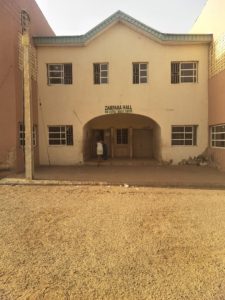By Shamsudeen Abubakar
Despite the intervention made towards the end of the second semester of the last session, the resident of Zamfara hostel, at Usmanu Danfodiyo University Sokoto (UDUS), was gripped by another water crisis, which subjected many of them to using dirty and unclean water for their daily needs.
This sparked many concerns among students who were demanding immediate action to resolve the issue. An investigation conducted by Abubakar Shamsudeen a reporter from The NEWS DIGEST PRESS revealed that the situation persisted with students suffered in silence.
Popoola Omowumi Iyanuoluwa, a 400-level student from the Department of Education, was one of the many students affected. Her face was engulfed with worries as she recounted her morning struggle then.
“Zamfara hostel didn’t have water; the little it had then was dirty,” she said, with her face laced with frustration. “One would think they put bournvita or tea inside it. I had to use Alum to settle the water.”
According to her, the water always comes like the urine of someone who has malaria. Her eyes widened in exasperation as she explained that even the alternative reservoir failed them, leaving her to rely only on the mosque’s reservoir for her daily needs.
“ I used to send the yarinya girls to fetch water for me from the Jubril Aminu Mosque because Zamfara hostel water was not working, the only working source is the one outside, which was fixed last year. But the water comes out in small quantities and there’s always a long queue.
“The reservoirs were not functioning. The only reservoir I trusted is the one in the mosque; I used it to cook and wash my clothes.” Despite having sufficient water that day, she explained that it was ironically very dirty.
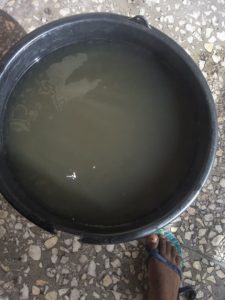
Unhygienic Water, the Dirty Situation of Water in Nigeria Now
According to the Multiple Indicator Cluster Survey (MICS), 90% of Nigerian households consume contaminated water, with 90.8% of households drinking water contaminated by faeces and other impure substances like E.coli.
The water and sanitation situation in Nigeria is worrisome, with water-borne diseases like diarrhoea being a leading cause of hospital admissions, especially among under-five children.
Also, Nigeria water statistics (Key Stats & Facts), 2023, revealed that access to clean drinking water in Nigeria is now a luxury many can’t afford. Shockingly, 29% of children don’t have enough water to meet their daily needs, and 73% of diarrhoea and enteric disease cases are linked to poor water, sanitation, and unhygienic conditions.
Even popular brands like Bigi Table Water aren’t immune to contamination. Research reveals 30% of commercial bottled and sachet water contains bacteria, while 58% of sachet water fails to meet WHO standards.
The cost of commercial water is staggering, with sachet water costing up to 20 times more than tap water from the Nigerian water Board.
The impact in children is devastating, with water-borne diseases disproportionately affecting the poor and disadvantaged. Poor access to clean water and sanitation contributes significantly to high mortality rates among children under five and vulnerable.
Tapes of Inequality Amidst Water Woes
Similarly, Suadiqah Sa’eed, a 300-level Political Science student, had pressing concerns. Living in IB Hostel, she noticed a stark contrast between her hostel and DV hostel who had enough water.
“ I believed there was disparity” Suadiqah said, her voice laced with frustration. “Is there a difference between people living in DV hostels and others?” Why DV hostels enjoy a steady 24/7 flow, other hostels, like Suadiqah’s, receive water at specific times – or sometimes not at all.
Suadiqah recalled instances where she had to skip cooking or bathing due to water scarcity. “I arrive late to lectures most of the time,” she admited, her face saddened with distress.
However, Raheem Hanifah, a resident of the FBI hostel, had a unique perspective in the water situation. “Sometimes, the water was dirty when they bring it, but it clears up after a while,” she says.
The Water’s cleanliness was unpredictable, with some mornings yielding water that’s kinky suitable for bathing. Despite this, Hanifah finds ways to adapt.
When faced with dirty water, some students used alum to settle the impurities or wait for the water to clear. However, Hanifah preferred to err on the side of caution. “Personally, I didn’t fetch the water when it’s dirty,” she admited.
Her concerned about the water quality were rooted in the potential health risks. “I heard that dirty water can cause skin issues in some people,” she said, opting to visit DV hostel for clean water.”
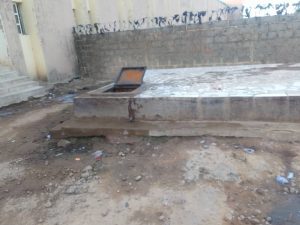
Photo Credit: Shamsudeen Abubakar
“My whole body was itching. I was scratching, so I bought medicine to cure it. The quality of the water was not so good; it always caused me problems when I used it,” Omowumi complained. She further stressed that her friend often fell ill after using the same water.
Not a One- size-fits-all Situation
Tomiwa, a final-year student of the Educational Foundations Department, however, recounted a different perspective. “Our water was enough because we don’t have many students; we managed it well,” she said, comparing it to the Zamfara hostel, where they were suffering so much.
Nafisa, a resident of Kwankwasiyya hostel said that the water in her hostel was always clean.
Khadija, a Guidance and Counselling final-year student residing in DV hostel, recounted a Charmeleon view. “We used to have enough water , but since last session, it’s been inconsistent. Sometimes it came in the evening, and if we had an 8 am lecture, we had to fetch water the evening before.”
She noted that while the water quality in her hostel was generally clean, it occasionally appeared red in the morning but clears up later. Khadija also mentioned that despite some issues, like recent phone thefts in the DV hostel, the hostel’s water situation wasn’t as bad as others using alum.
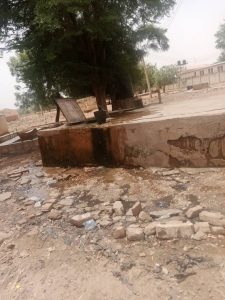
Photo Credit: Shamsudeen Abubakar
Regarding comparisons with other hostels, she stated that prices were the same, but DV hostel was built by the school, whereas others were private projects.
Empty Tanks, Dirty Water, Poor Supply
In an interview with the Deputy Dean of Student Affairs, Dr. Tukur Muhammad Mukhtar, he revealed that the university collaborated with the UDUS Alumni Association, led by National President Bello Kwari, and the Ministry of Water Resources to construct a powered borehole tank. This project aimed to alleviate water supply challenges in the female hostels like Zamfara.
“The absence of adequate water supply would lead to poor hygiene and sanitation. Upon learning that Zamfara hostel residents were struggling, we initiated this project. We’re pleased that there haven’t been issues since the beginning of this session; the alumni’s efforts have been commendable,” Dean said.
However,an investigation by the News Digest Press found that despite the new tank construction, students still face water supply challenges and use unhygienic water. Observations revealed that many hostels continue to struggle with accessing water.
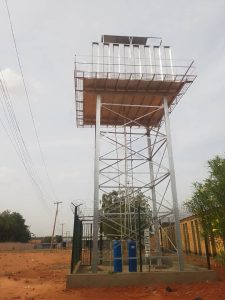
Photo Credit: Shamsudeen Abubakar
SU-CTC Welfare Director Assures Lasting Change
In an exclusive interview with the News Digest Press Board UDUS, Aminu Kalgo, the SU-CTC Welfare Director expressed concerns and hope for making necessary amends on the poor water in the female hostels.
“Firstly, I want to thank you for bringing this issue to my attention. I will immediately investigate this matter to determine the facts and speak with the relevant authorities to understand the current state of water supply in both hostels,” he said.
“As an institution, we have equality and fairness. Students saying they are not having the same type of water is unacceptable. But I will give you an update on the progress we make after I’ve looked into it. Kalgo appreciated the reporter for highlighting students’ concern.

